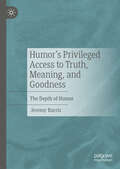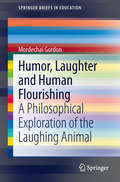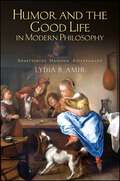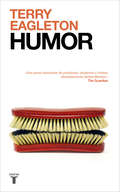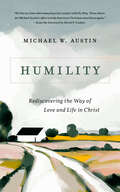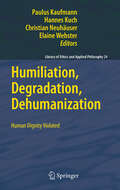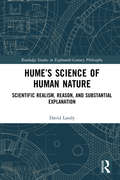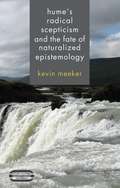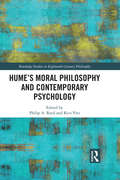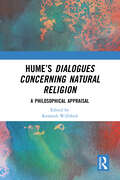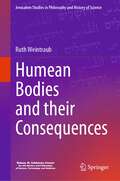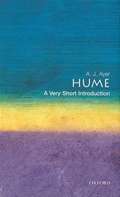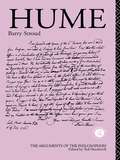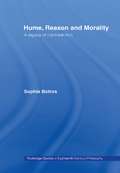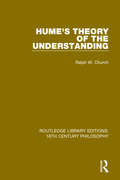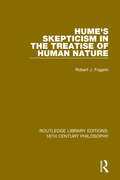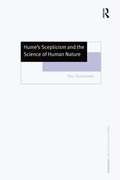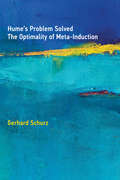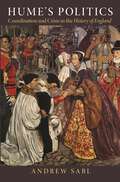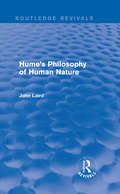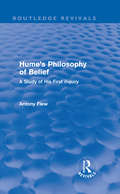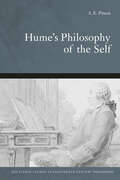- Table View
- List View
Humor’s Privileged Access to Truth, Meaning, and Goodness: The Depth of Humor
by Jeremy BarrisThis book explores three connected insights into humor. First, that humor provides a privileged access to the deepest kind of truth, the sense as such of its topics and so of their very reality. It is argued that humor allows us to see things afresh and truly by flouting the sense of the things it deals with so enabling us to step outside of our taken for granted immersion in that sense. As a result, the character of the true sense stands out against the contrast of its nonsensical distortion. Second, that because of the way humor accesses truth, it also brings out the essential meaning of relevant value including the good and the worthwhile. Third, humor enables a privileged coordination and negotiation of profoundly conflicting truths and values. Humor’s access to truth is privileged both in its depth, even with respect to metaphysics, and also because it establishes the truth of what it shows. Humor’s Privileged Access to Truth, Meaning, and Goodness is essential reading for all scholars and researchers of the philosophy of humor.
Humor, Laughter and Human Flourishing: A Philosophical Exploration of the Laughing Animal
by Mordechai GordonThis book is a philosophical investigation of the significance of humor and laughter, examining its relation to other human phenomena including truth, nihilism, dreams, friendship, intimacy, aesthetic experience, self-transcendence and education. The author addresses the relative neglect of humor and laughter among philosophers of education with this volume, where the focus is on the significance of humor and laughter for human flourishing. Central questions are threaded through this work: What does the study of humor and laughter bring to philosophy and specifically to philosophy of education? How is humorist thinking different from other modes of human knowing? What might happen if we were to respond to the absurdity of human existence with humor and laughter? What insights can be learned from a philosophical investigation of humor in relationship to other human phenomena such as dreams, friendship, intimacy, aesthetic experience and self-transcendence? And, finally, how can humor and laughter enhance human existence and flourishing? The author presents groundbreaking insights into what can be gained from a study of humor and laughter about human existence in general and flourishing in particular. This work will be of interest to philosophers, especially philosophers of education, as well as to teachers and educators. Its unique blend of philosophical investigation and humorous discourse is both a rigorous and accessible analysis of humor.
Humor and the Good Life in Modern Philosophy: Shaftesbury, Hamann, Kierkegaard
by Lydia B. AmirBy exploring the works of both Anthony Ashley Cooper, Third Earl of Shaftesbury, and Søren Kierkegaard, Lydia B. Amir finds a rich tapestry of ideas about the comic, the tragic, humor, and related concepts such as irony, ridicule, and wit. Amir focuses chiefly on these two thinkers, but she also includes Johann Georg Hamann, an influence of Kierkegaard's who was himself influenced by Shaftesbury. All three thinkers were devout Christians but were intensely critical of the organized Christianity of their milieux, and humor played an important role in their responses. The author examines the epistemological, ethical, and religious roles of humor in their philosophies and proposes a secular philosophy of humor in which humor helps attain the philosophic ideals of self-knowledge, truth, rationality, virtue, and wisdom.
Humor (Routledge filosofie)
by Simon CritchleyHumor is een fascinerend, prachtig geschreven en komisch boek over wat homor ons kan vertellen over onze menselijke natuur.Van de oudheid tot aan de moderne tijd en puttend uit het werk van een breed scala aan auteurs, in het bijzonder Swift, Sterne, Shaftesbury, Bergson, Beckett en Freud, keert Humor het komische binnenstebuiten en onthult ons een smakelijk inzicht in wat we grappig vinden. Humor beantwoordt vragen zoals: "Waarom lijden komieken aan depressies", "Waarom lachen we zo vaak om dieren" en "Wat gebeurt er in racistische en seksistische humor".Humor zal niet alleen de lezers uit een reeks van disciplines zoals filosofie, theologie, literatuurwetenschap, psycholanalyse, geschiedenis en antropologie aanspreken, maar ook zeer tot de verbeelding spreken van een ieder met een gevoel voor humor - ieder van ons dus, hopelijk.
Humor
by Terry EagletonUN PASEO POR LOS LUGARES FUNDAMENTALES QUE OCUPA EL HUMOR EN LA CULTURA OCCIDENTAL, CON EL GUÍA MÁS AUTORIZADO (Y GRACIOSO). ¿Por qué nos reímos? ¿Qué ganamos con tanta carcajada? ¿Es el humor un agente subversivo o un remedio para las tensiones? ¿Cómo definir el ingenio? Escrito por un reconocido maestro de la comedia, este libro es una muestra perfecta de la naturaleza del humor y de sus funciones. Armado de agudas ocurrencias y un buen puñado de excelentes chistes, examina con mirada crítica las principales teorías del humor, como la idea de que este brota de la incongruencia o de que es el reflejo de una forma ligeramente sádica de sentimiento de superioridad con respecto a los demás. Terry Eagleton nos guía a las entrañas del humor basándose en una amplia gama de fuentes literarias y filosóficas, acompañado de Aristóteles, Rabelais, Hobbes y Freud, entre muchos otros, pero apoyándose también en ejemplos como los Monty Python o la stand-up comedyy deteniéndose en los mecanismos psicoanalíticos que subyacen al humor y en su evolución social y política a lo largo de los siglos. La crítica ha dicho...«Una prosa rebosante de paradojas, vituperios y chistes absolutamente desternillantes.»The Guardian «Si Terry Eagleton no existiera habría que inventarlo.»Simon Critchley «Una introducción concisa y divertida, con un análisis sensato del papel contradictorio del humor en la política. Eagleton es un guía ingenioso y tenaz, además de tremendamente gracioso.»Harper's «Delicioso y admirable. Cada frase es sencilla pero aporta una idea nueva. Se puede abordar como una lectura rápida y divertida, o como una lectura sosegada para explorar las profundidades ocultas que acechan detrás de cada nuevo ejemplo. Una espléndida puerta de entrada al tema.»Popmatters
Humility: Rediscovering the Way of Love and Life in Christ
by Michael W. AustinAmid culture wars and church division, Michael W. Austin calls us back to the authentic Way—following Christ in humility and love. American Christians have lost the Way. We chase power and comfort and coat our self-righteousness in a Christian veneer. We comfort ourselves that we follow the rules and go to church, so life will work out for us. But we have forgotten what it means to truly follow Christ. Michael Austin brings us back to basics of the Christian life: humility and love. Drawing on Philippians and 1 Corinthians, Austin reminds us how Jesus, in love, poured himself out for others. This other-centeredness stands contrary to vainglorious affirmation in our lives, online and off—and it is the key to healing the deep divisions in our communities. Austin guides the reader through spiritual disciplines to aid in the formation of this virtue, from praying the Psalms to building healthy communities. For Christians seeking transformative union with God, in their souls and society, Humility is the ideal companion.
Humiliation, Degradation, Dehumanization
by Hannes Kuch Elaine Webster Paulus Kaufmann Christian NeuhaeuserDegradation, dehumanization, instrumentalization, humiliation, and nonrecognition - these concepts point to ways in which we understand human beings to be violated in their dignity. Violations of human dignity are brought about by concrete practices and conditions; some commonly acknowledged, such as torture and rape, and others more contested, such as poverty and exclusion. This volume collates reflections on such concepts and a range of practices, deepening our understanding of human dignity and its violation, bringing to the surface interrelationships and commonalities, and pointing to the values that are thereby shown to be in danger. In presenting a streamlined discussion from a negative perspective, complemented by conclusions for a positive account of human dignity, the book is at once a contribution to the body of literature on what dignity is and how it should be protected as well as constituting an alternative, fresh and focused perspective relevant to this significant recurring debate. As the concept of human dignity itself crosses disciplinary boundaries, this is mirrored in the unique range of perspectives brought by the book's European and American contributors - in philosophy and ethics, law, human rights, literature, cultural studies and interdisciplinary research. This volume will be of interest to social and moral philosophers, legal and human rights theorists, practitioners and students.
Hume’s Science of Human Nature: Scientific Realism, Reason, and Substantial Explanation (Routledge Studies in Eighteenth-Century Philosophy)
by David LandyHume’s Science of Human Nature is an investigation of the philosophical commitments underlying Hume's methodology in pursuing what he calls ‘the science of human nature’. It argues that Hume understands scientific explanation as aiming at explaining the inductively-established universal regularities discovered in experience via an appeal to the nature of the substance underlying manifest phenomena. For years, scholars have taken Hume to employ a deliberately shallow and demonstrably untenable notion of scientific explanation. By contrast, Hume’s Science of Human Nature sets out to update our understanding of Hume’s methodology by using a more sophisticated picture of science as a model.
Hume’s Radical Scepticism and the Fate of Naturalized Epistemology
by Kevin MeekerWas David Hume radically sceptical about our attempts to understand the world or was he merely approaching philosophical problems from a scientific perspective? Most philosophers today believe that Hume's outlook was more scientific than radically sceptical and that his scepticism was more limited than previously supposed. If these philosophers are correct, then Hume's approach to philosophy mirrors the approach of many contemporary philosophers. This similarity between Hume and many aspects of contemporary philosophy suggests that we should try to understand Hume not as an historical relic but as a partner in a continuing philosophical dialogue. When we look closely at Hume's thoughts about human understanding, we find that Hume's scepticism emerges very insistently in the context of Hume's scientific approach. This book tries to come to terms with Hume's scepticism in a way that sheds light on contemporary philosophy and its relationship to science.
Hume’s Moral Philosophy and Contemporary Psychology (Routledge Studies in Eighteenth-Century Philosophy)
by Rico Vitz Philip A. ReedRecent work at the intersection of moral philosophy and the philosophy of psychology has dealt mostly with Aristotelian virtue ethics. The dearth of scholarship that engages with Hume’s moral philosophy, however, is both noticeable and peculiar. Hume's Moral Philosophy and Contemporary Psychology demonstrates how Hume’s moral philosophy comports with recent work from the empirical sciences and moral psychology. It shows how contemporary work in virtue ethics has much stronger similarities to the metaphysically thin conception of human nature that Hume developed, rather than the metaphysically thick conception of human nature that Aristotle espoused. It also reveals how contemporary work in moral motivation and moral epistemology has strong affinities with themes in Hume’s sympathetic sentimentalism.
Hume’s Dialogues Concerning Natural Religion: A Philosophical Appraisal
by Kenneth WillifordDavid Hume’s Dialogues Concerning Natural Religion is a philosophical and literary classic of the highest order. It is also an extremely relevant work because of its engagement with issues as alive today as in Hume’s time: the Design Argument for a deity, the Problem of Evil, the dangers of superstition and fanaticism, the psychological roots and social consequences of religion. In this outstanding and unorthodox collection, an international team of scholars engage with Hume’s classic work. The chapters include state-of-the-art contributions on the central interpretive questions posed by the Dialogues as well as major contributions relating the work to contemporary issues in Philosophy of Religion, Philosophy of Science, Moral Psychology, and Social Philosophy. Additional contributions tackle the historical and philosophical background of the Dialogues, relating it to Hume’s own systematic philosophy, to the work of other key seventeenth and eighteenth-century figures – Locke, Clarke, Bayle, Cudworth, Malebranche, Spinoza, Lord Bolingbroke, and Voltaire, among others – to early modern neo-Epicureanism in the life sciences, and, notably, to what Darwin missed by thinking too much like William Paley and not enough like Hume’s Philo. Overall, this volume provides fresh and even groundbreaking perspectives on Hume’s Dialogues Concerning Natural Religion. It is essential reading for students and scholars of Hume, the History of Modern Philosophy, Philosophy of Religion and the History and Philosophy of Science.
Humean Bodies and their Consequences (Jerusalem Studies in Philosophy and History of Science)
by Ruth WeintraubThis book defends the very contentious Idealist interpretation of Hume on external objects, and draws from it far-reaching metaphysical and epistemological consequences for Hume’s philosophy. Its interest is both interpretive and analytic. The content Hume ascribes to the belief in “bodies” is susceptible to more than one reading, and has not been systematically considered. Upholding the Idealistic interpretation is interesting in its own right, but also yields several important conclusions about the spatiality of objects, causation, Hume’s “science of man” and his epistemology. For instance, it argues that the Idealist reading means that there are no cross-temporal spatial relationships, and that the (more prevalent) Materialist reading takes Hume further away from methodological empiricism than does the Idealist counterpart, and may render his practice less in conformity with his official methodology. The monograph is therefore of great interest to not only academics but also scholars, graduate students and researchers.
Hume: Critical Essays On Locke, Berkeley, And Hume (The Routledge Philosophers)
by Don GarrettBeginning with an overview of Hume's life and work, Don Garrett introduces in clear and accessible style the central aspects of Hume's thought. These include Hume's lifelong exploration of the human mind; his theories of inductive inference and causation; skepticism and personal identity; moral and political philosophy; aesthetics; and philosophy of religion. The final chapter considers the influence and legacy of Hume's thought today. Throughout, Garrett draws on and explains many of Hume's central works, including his Treatise of Human Nature, Enquiries Concerning Human Understanding, and Dialogues Concerning Natural Religion. Hume is essential reading not only for students of philosophy, but anyone in the humanities and social sciences and beyond seeking an introduction to Hume's thought.
Hume: An Enquiry Concerning Human Understanding
by Stephen BuckleDavid Hume's An Enquiry Concerning Human Understanding, first published in 1748, is a concise statement of Hume's central philosophical positions. It develops an account of human mental functioning which emphasizes the limits of human knowledge and the extent of our reliance on (non-rational) mental habits. It then applies that account to questions of free will and religious knowledge before closing with a defence of moderate scepticism. This volume, which presents a modified version of the definitive 1772 edition of the work, offers helpful annotation for the student reader, together with an introduction that sets this profoundly influential work in its philosophical and historical contexts. The volume also includes a selection of other works by Hume that throw light on both the circumstances of the work's genesis and its key themes and arguments.
Hume: A Very Short Introduction
by Alfred Jules AyerBiography of Hume and a cogent discussion of his philosophy.
Hume-Arg Philosophers: Critical Essays On Locke, Berkeley, And Hume (Colección Filosofía Contemporánea Ser.)
by Barry StroudFirst published in 1999. Routledge is an imprint of Taylor & Francis, an informa company.
Hume, Reason and Morality: A Legacy of Contradiction (Routledge Studies in Eighteenth-Century Philosophy)
by Sophie BotrosCovering an important theme in Humean studies, this book focuses on Hume's hugely influential attempt in book three of his Treatise of Human Nature to derive the conclusion that morality is a matter of feeling, not reason, from its link with action. Claiming that Hume's argument contains a fundamental contradiction that has gone unnoticed in modern debate, this fascinating volume contains a refreshing combination of historical-scholarly work and contemporary analysis that seeks to expose this contradiction and therefore provide a significant contribution to current scholarship in the area. Sophie Botros begins by pointing out that a contradiction concerning whether reason can influence action, or is wholly powerless, occurs in the intermediary premiss. She then moves on to draw out the consequences for recent meta-ethics of the failure to acknowledge this contradiction. Finally, highlighting the root of the argument's power in an article of naturalistic dogma, she suggests how it may be possible to restore to our moral concepts their traditional and integral link with both truth and motivation. A significant and thought-provoking addition to this popular field of study, Hume, Reason and Morality is undoubtedly an important resource for moral philosophers interested in meta-ethics and practical reason, as well as Humean scholars.
Hume's Theory of the Understanding (Routledge Library Editions: 18th Century Philosophy #7)
by Ralph W. ChurchThis book, first published in 1935, is an examination of Hume’s theories of causal inference and belief in substance and his analysis of the understanding.
Hume's Skepticism in the Treatise of Human Nature (Routledge Library Editions: 18th Century Philosophy #6)
by Robert J. FogelinThis work, first published in 1985, offers a general interpretation of Hume’s Treatise of Human Nature. Most Hume scholarship has either neglected or downplayed an important aspect of Hume’s position – his scepticism. This book puts that right, examining in close detail the sceptical arguments in Hume’s philosophy.
Hume's Scepticism and the Science of Human Nature (Ashgate New Critical Thinking in Philosophy)
by Paul StanistreetThis book explores the relationship between Hume's sceptical philosophy and his Newtonian ambition of founding a science of human nature. Assessing both received and 'new' readings of Hume's philosophy, Stanistreet offers a line of interpretation which, he argues, makes sense of many of the apparent conflicts and paradoxes in Hume's work and describes how well-known controversies concerning Hume's thinking about causation, induction and the external world can be resolved. Stainstreet argues that Hume's notorious sceptical arguments are not the episodic outbursts of an unsystematic philosopher, but emerge as part of his attempt to provide science and philosophy with grounds which face up to and withstand the scepticism to which reflective thinkers are naturally prone. Offering important new contributions to Hume scholarship, this book also surveys and assesses the new research responsible for the recent sea-change in thinking about Hume. It offers an accessible overview of these developments while suggesting significant revisions to current readings of Hume's philosophy.
Hume's Problem Solved: The Optimality of Meta-Induction (The\mit Press Ser.)
by Gerhard SchurzA new approach to Hume's problem of induction that justifies the optimality of induction at the level of meta-induction.Hume's problem of justifying induction has been among epistemology's greatest challenges for centuries. In this book, Gerhard Schurz proposes a new approach to Hume's problem. Acknowledging the force of Hume's arguments against the possibility of a noncircular justification of the reliability of induction, Schurz demonstrates instead the possibility of a noncircular justification of the optimality of induction, or, more precisely, of meta-induction (the application of induction to competing prediction models). Drawing on discoveries in computational learning theory, Schurz demonstrates that a regret-based learning strategy, attractivity-weighted meta-induction, is predictively optimal in all possible worlds among all prediction methods accessible to the epistemic agent. Moreover, the a priori justification of meta-induction generates a noncircular a posteriori justification of object induction. Taken together, these two results provide a noncircular solution to Hume's problem.Schurz discusses the philosophical debate on the problem of induction, addressing all major attempts at a solution to Hume's problem and describing their shortcomings; presents a series of theorems, accompanied by a description of computer simulations illustrating the content of these theorems (with proofs presented in a mathematical appendix); and defends, refines, and applies core insights regarding the optimality of meta-induction, explaining applications in neighboring disciplines including forecasting sciences, cognitive science, social epistemology, and generalized evolution theory. Finally, Schurz generalizes the method of optimality-based justification to a new strategy of justification in epistemology, arguing that optimality justifications can avoid the problems of justificatory circularity and regress.
Hume's Politics: Coordination and Crisis in the History of England
by Andrew SablHume's Politics provides a comprehensive examination of David Hume's political theory, and is the first book to focus on Hume's monumental History of England as the key to his distinctly political ideas. Andrew Sabl argues that conventions of authority are the main building blocks of Humean politics, and explores how the History addresses political change and disequilibrium through a dynamic treatment of coordination problems. Dynamic coordination, as employed in Hume's work, explains how conventions of political authority arise, change, adapt to new social and economic conditions, improve or decay, and die. Sabl shows how Humean constitutional conservatism need not hinder--and may in fact facilitate--change and improvement in economic, social, and cultural life. He also identifies how Humean liberalism can offer a systematic alternative to neo-Kantian approaches to politics and liberal theory. At once scholarly and accessibly written, Hume's Politics builds bridges between political theory and political science. It treats issues of concern to both fields, including the prehistory of political coordination, the obstacles that must be overcome in order for citizens to see themselves as sharing common political interests, the close and counterintuitive relationship between governmental authority and civic allegiance, the strategic ethics of political crisis and constitutional change, and the ways in which the biases and injustices endemic to executive power can be corrected by legislative contestation and debate.
Hume's Philosophy of Human Nature (Routledge Revivals)
by John LairdThe essence of Hume’s eighteenth-century philosophy was that all the sciences were ‘dependent on the science of man’, and that the foundations of any such science need to rest on experience and observation. This title, first published in 1932, examines in detail how Hume interpreted ‘the science of man’ and how he applied his experimental methodology to humankind’s understanding, passions, social duties, economic activities, religious beliefs and secular history throughout his career. Particular attention is paid to the English, French and Latin sources that shaped Hume’s theories. This is a full and fascinating title, of particular relevance to students with an interest in the philosophy of Hume specifically, as well as the philosophy of human nature and the methodologies applied to its study more generally.
Hume's Philosophy of Belief: A Study of His First 'Inquiry' (Routledge Revivals)
by Antony FlewFirst published in 1961, this book considers Hume’s request to be judged solely by the acknowledged works of his maturity. It focuses on Hume’s first Inquiry in its own right as a separate book to the likes of his other works, such as the Treatise and the Dialogues, which are here only used as supplementary evidence when necessary. This approach brings out, as Hume himself quite explicitly wished to do, the important bearing of his more technical philosophy on matters of religion and of world-outlook generally: "Be a philosopher; but amidst all your philosophy, be still a man."
Hume's Philosophy Of The Self (Routledge Studies in Eighteenth-Century Philosophy)
by Tony PitsonFirst Published in 2002. Routledge is an imprint of Taylor & Francis, an informa company.
